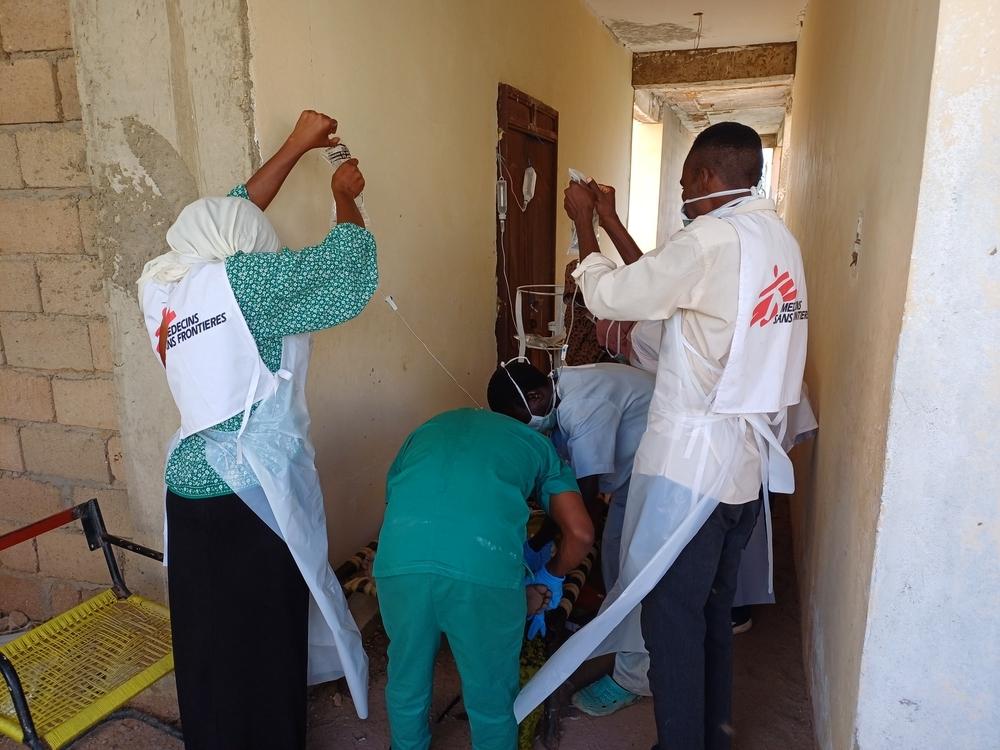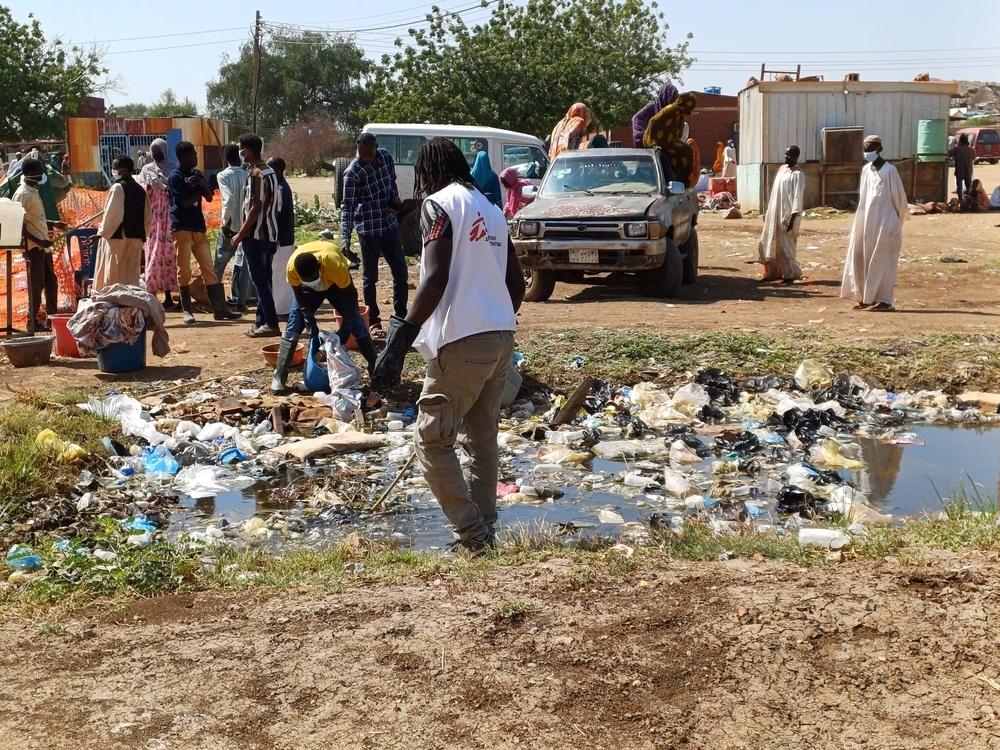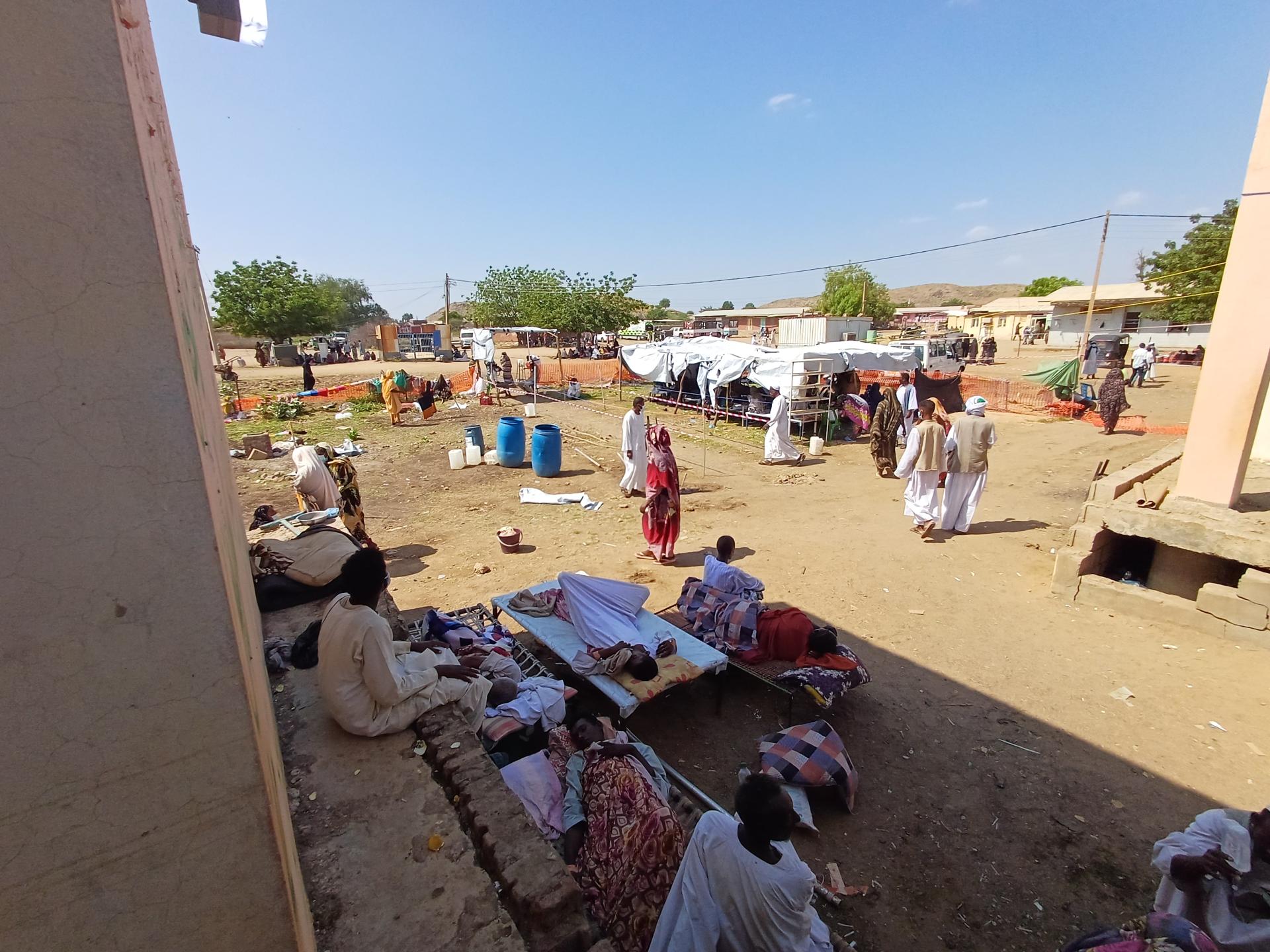In a 150-bed Cholera Treatment Centre (CTC) in Al Fao Hospital in Sudan's eastern Gedaref state, patients collapsed on the ground, vomiting and pleading for help. With not enough room in the ward already packed with other patients, doctors and paramedics were forced to attend to more patients lying in hallways and on hospital’s ground. At one point, doctors and nurses stood over patients, manually holding bags of intravenous (IV) fluid due to a shortage of IV drip stands. Meanwhile, non-medical MSF, Ministry of Health (MoH) staff and even caregivers stepped in to assist, distributing oral rehydration salt (ORS) to patients to urgently rehydrate them and save their lives.
A young boy sat beside his mother, who was suffering from cholera, unable to comprehend that she was gone. He shook her gently, thinking she was merely asleep, but she was not asleep—she had passed away. The shock of her death left him momentarily silent before he was overcome with grief, tears streaming down his face. Nearby, another patient who had briefly shown signs of improvement after receiving fluids began to fade. Despite the doctors’ best efforts to rehydrate him, his body’s response was too weak. The doctors explained that his arteries were so dry that even the fluids could not revive him.
The dedicated doctors and nurses and affiliated staff, from the MoH and MSF, worked together tirelessly, doing everything possible to save lives amid challenging conditions. The intense heat, compounded by wearing medical gowns and gloves that left them soaked in sweat, and lack of supplies and ruptures were to name few.
Although, as a doctor, I’ve seen quite a few deaths, it is always difficult to witness one. You always feel a sense of guilt—did I do enough to save this life? Could I have done something differently to prevent this?Dr. Asma Abbas, MSF doctor

Since the conflict erupted in Sudan in April 2023, the country has been plunged into turmoil. Thousands have lost their lives, and millions have been displaced, forced to flee their homes and seek refuge elsewhere within Sudan and beyond. Amid this chaos, MSF has adapted its operations to respond to the evolving humanitarian needs—supporting war-damaged health facilities and deploying mobile clinics. MSF works in 11 of Sudan’s 18 states, running and supporting health facilities as well as launching short-term emergency responses as urgent needs arise, like its support to the MoH’s Al Fao Hospital CTC.
In Gedaref State and elsewhere in the country, the consequences of the ongoing conflict have been devastating. More recently, armed clashes and the ensuing violence in Al Jazirah State drove hundreds of thousands of people into Gedaref state and beyond. For many, it was not the first time they had to flee shelter to escape the violence.
Salman Al Taha, a man in his forties coming from eastern Al Jazirah State, shared how, in just one year, he was forced to move between four different houses across three cities. The constant upheaval left him and many others feeling unstable, with no sense of security. Another woman in her twenties named Afra Salah, spoke of the terrifying experiences she endured as she moved from one place to another.
She was robbed once, witnessed her father being beaten by militant groups, and, on another occasion, had to bribe militants just to be allowed to move to a safer location—all while facing severe shortages of food and water. With such dire circumstances, one woman said, "If this is life, I wonder what hell is."

Fleeing violence and enduring dangerous journeys does not guarantee safety for people across Sudan. In Gedaref and other parts of the country, displaced communities are forced to live in overcrowded conditions, lacking proper shelter, safe drinking water, and adequate sanitation and hygiene facilities. While a recent cholera outbreak in this region had begun to decline, a new wave of displacement has led to the resurgence and spread of the disease among the population.
The cholera outbreak is affecting displaced people particularly through person-to-person transmission as they flee violence in large numbers. The outbreak is exacerbated by a lack of access to safe water and basic sanitation as people are already vulnerable from long journeys and are more vulnerable to severe dehydration associated with cholera. This is a factor leading to higher mortality rates (4.5%) than would typically be expected from cholera (<2%). In the MSF supported CTC in Al Fao, 70 patients died in November, out of 1549 patients admitted.
In Al Fao to off-load the CTC and to provide support closer to the “hotspots” of transmission, MSF teams simultaneously launched a community cholera intervention. MSF set up and supported oral rehydration points (ORPs) in two nearby displacement gathering sites, Harira and Al Boudra, as well as in a nearby village by training and incentivizing volunteer staff and donating essential medical supply as well as the provision of safe water.
In recent weeks, fewer people have been arriving in Al Fao. Alongside the scaling up of safe water provision in gathering sites by MSF and other actors, there has been a decline in daily admissions to the Cholera Treatment Center (CTC) at Al Fao Hospital, with numbers now nearing single digits. In the coming days, MSF will hand back management of the CTC to the Ministry of Health (MoH) and its staff, providing essential supplies so the facility can continue treating patients.
MSF is prioritising making staff, supplies and resources to be available for the most acute phases of emergencies. Given the level of violence and high needs in Sudan show no sign of abating - access to health services will continue to be stretched to breaking point with emergencies sadly foreseeable.
